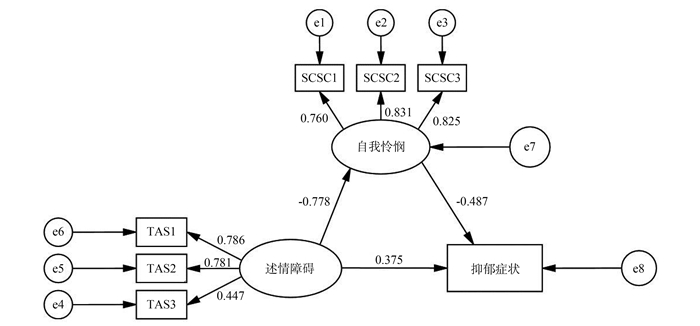The mediating effect of self-compassion between alexithymia and depressive symptoms in depression patients
-
摘要:
目的 评估抑郁症患者自我怜悯、述情障碍和抑郁症状,探讨自我怜悯在述情障碍和抑郁症状的中介作用。 方法 采用中文版自我怜悯量表(self-compassion scale, SCS-C)和中文版多伦多述情障碍量表(Toronto alexithymia scale, TAS-20)对117例抑郁症患者和106例健康对照组作评估,同时患者接受中文版贝克抑郁自评量表(Beck depression rating scale, BDI)评估。选用线性回归分析模型对抑郁症患者自我怜悯、述情障碍和抑郁症状以及各维度之间的关系进行分析,使用AOMS 23.0软件进行中介效应检验。 结果 抑郁症患者组SCS-C总分及三因子分均低于对照组(均有P < 0.05),患者组TAS-20总分及三因子分均高于对照组(均有P < 0.05);相关分析显示,患者SCS-C总分及各因子分、TAS-20总分及各因子分和抑郁症状分间均两两相关(均有P < 0.05);回归分析模型发现:述情障碍及各因子对自我怜悯有负性预测作用;自我怜悯及各因子对抑郁症状有负性预测作用;述情障碍及各因子对抑郁症状有正性预测作用。自我怜悯在述情障碍与抑郁症状间起着部分中介作用。 结论 抑郁症患者存在自我怜悯损害和述情障碍,述情障碍通过自我怜悯水平的部分中介效应对抑郁症状产生影响。提高抑郁症患者的自我怜悯水平可能是改善抑郁症状的干预措施之一。 Abstract:Objective To assess the self-compassion, alexithymia and depressive symptoms in patients with depression, and to explore the mediating effects of self-compassion between alexithymia and depressive symptoms. Methods 117 depression patients and 106 healthy subjects were measured using the Chinese version of revised self-compassion scale (SCS-C), the Chinese version of Toronto alexithymia scale (TAS-20). The patients were also assessed with the Chinese version of Beck depression rating scale (BDI), Linear regression analysis model was used to analyze the relationship between self-compassion, alexithymia, depressive symptoms and its dimensions. The mediating effect was tested with AOMS 23.0 software. Results Compared with the healthy controls, depressive patients had significantly lower SCS-C total score and the scores of three factors (all P < 0.05). Patients had significantly higher TAS-20 total score and the scores of three factors Compared to healthy controls (all P < 0.05). Correlation analysis model showed in the patients' group, there were significant correlation between SCS-C total score and three subscale score, the total score of TAS-20 and three subscale score and the score of depression symptoms. Regression analysis model showed that alexithymia and the three factors had negative predictive effect on self-compassion; self-compassion and the three factors had negative predictive effect on depressive symptoms; alexithymia and the three factors had positive predictive effect on depressive symptoms. Part of mediator effect of self-compassion was significant between alexithymia and depressive symptoms level. Conclusions Depression patients have impairments of self-compassion and alexithymia, and self-compassion is a part of mediator by which alexithymia influence depressive symptoms. Improving the depression patient's level of self-compassion may be one of the interventions to improve depressive symptoms in clinical practice. -
Key words:
- Depression /
- Self-compassion /
- Alexithymia /
- Depressive symptoms
-
表 1 患者组和对照组一般人口统计学特征及临床症状(x±s)
Table 1. Demographic and clinical characteristics of the depression patients and control group (x±s)
变量 患者组(117) 对照组(106) t/χ2值 P值 性别[n(%)] 0.408 0.523 男 34(29.06) 35(33.02) 女 83(70.94) 71(66.98) 年龄(岁) 29.64±7.54 30.29±8.21 -0.139 0.832 受教育年限(年) 14.64±2.41 14.64±2.41 -1.876 0.069 病程(月) 47.24±48.24 用药情况[n(%)] 未用 65(55.56) 曾用 52(44.44) 单一用药 23(44.23) 联合用药 29(55.77) BDI评分(分) 17.47±7.85 表 2 患者组和对照SCS-C和TAS-20评分比较(x±s)
Table 2. Comparison of SCS-C and TAS-20 between depression patients and control group (x±s)
变量 患者组(n=117) 对照组(n=106) t值 P值 SCS-C总分 61.66±13.54 95.10±11.93 -19.48 < 0.001 自我友善 25.50±6.44 36.98±5.26 -14.48 < 0.001 普遍人性 18.86±4.75 28.70±4.33 -16.10 < 0.001 正念 17.29±4.61 29.42±4.37 -20.12 < 0.001 TAS-20总分 65.12±9.06 51.31±9.79 10.94 < 0.001 难以识别自己的情感 3.61±0.71 2.54±0.42 8.27 < 0.001 难以描述自己的情感 3.34±0.65 2.63±0.62 5.93 < 0.001 外向性思维 2.90±0.46 2.54±0.44 10.94 < 0.001 表 3 抑郁症患者SCS-C、TAS-20和BDI评分间的相关分析
Table 3. Correlation among the scores of SCS-C, TAS-20 and BDI in patients with depression
项目 SCS总分 自我友善 普遍人性 正念 TAS-20总分 难以识别自己的情感 难以描述自己的情感 外向性思维 自我友善 0.870b 普遍人性 0.873b 0.619b 正念 0.823b 0.522b 0.669b TAS-20总分 -0.575b -0.449b -0.513b -0.534b 难以识别自己的情感 -0.510b -0.378b -0.481b -0.473b 0.858b 难以描述自己的情感 -0.479b -0.385b -0.443b -0.414b 0.790b 0.614b 外向性思维 -0.311b -0.259b -0.247b -0.317b 0.618b 0.233a 0.243b BDI评分 -0.673b -0.533b -0.588b -0.626b 0.641b 0.519b 0.499b 0.444b 注:a:P < 0.05;b:P < 0.01。 表 4 抑郁症患者述情障碍对自我怜悯的回归分析
Table 4. Regression analysis of depression patients' alexithymia by self-compassion
因变量 预测变量 β值 标准化β值 t值 F值 R2值 回归模型1 常数项 117.652 15.681c 56.767c 0.330 SCS-C总分 TAS-20总分 -0.860 -0.575 -7.534c 回归模型2 常数项 115.905 14.566c 18.876c 0.344 SCS-C总分 难以识别自己的情感 -6.188 -0.322 -3.286b 难以描述自己的情感 -4.985 -0.239 -2.434a 外向性思维 -5.279 -0.178 -2.241c 注:a:P < 0.05;b:P < 0.010;c:P < 0.001。 表 5 抑郁症患者自我怜悯对抑郁症状的回归分析
Table 5. Regression analysis of depression patients' self-compassion by depressive symptom
因变量 预测变量 β值 标准化β值 t值 F值 R2值 回归模型1 常数项 41.513 16.452c BDI评分 SCS-C总分 -0.390 -0.673 -9.754c 95.141c 0.453 回归模型2 常数项 41.523 16.567c BDI评分 自我友善 -0.254 -0.208 -2.347a 33.324c 0.469 普遍人性 -0.339 -0.205 -2.011a 正念 -0.647 -0.380 -4.049c 注:a:P < 0.05;c:P < 0.001。 表 6 抑郁症患者述情障碍对抑郁症状的回归分析
Table 6. Regression analysis of depression patients' alexithymia by depressive symptom
因变量 预测变量 β值 标准化β值 t值 F值 R2值 回归模型1 常数项 -18.692 -4.581c BDI评分 TAS-20总分 0.555 0.641 8.948c 80.060c 0.410 回归模型2 常数项 -19.904 -4.601c BDI评分 难以识别自己的情感 3.336 0.229 3.261c 33.324c 0.415 难以描述自己的情感 2.887 0.239 2.594a 外向性思维 5.419 0.316 4.235c 注:a:P < 0.05;c:P < 0.001。 -
[1] Krieger T, Berger T. The relationship of self-compassion and depression: cross-lagged panel analyses in depressed patients after outpatient therapy[J]. J Affect Disord, 2016, 202:39-45. DOI: 10.1016/j.jad.2016.05.032. [2] 冼君定, 谭健烽, 万崇华, 等. WHOQOL-BREF量表用于精神分裂症和抑郁症的信效度研究[J].中华疾病控制杂志, 2015, 19(5):500-503. DOI: 10.16462/j.cnki.zhjbkz.2015.05.019.Xian DJ, Tan JF, Wan CH, et al. Reliability and validity of WHOQOL-BREF in measurements of quality of life in patients with depression and schizophrenia[J]. Chin J Dis Control Prev, 2015, 19(5):500-503. DOI: 10.16462/j.cnki.zhjbkz.2015.05.019. [3] Brophy K, Brähler E, Hinz A, et al. The role of self-compassion in the relationship between attachment, depression, and quality of life[J]. J Affect Disord, 2020, 26(1):45-52. DOI: 10.1016/j.jad.2019.08.066. [4] Diedrich A, Burger J, Kirchner M. Adaptive emotion regulation mediates the relationship between self-compassion and depression in individuals with unipolar depression[J]. Psychol Psychother, 2017, 90(3):247-263. DOI: 10.1111/papt.12107. [5] Hemming L, Haddock G, Shaw J. Alexithymia and its associations with depression, suicidality, and aggression: an overview of the literature[J]. Front Psychiatry, 2019, 10:203. DOI: 10.3389/fpsyt.2019.00203. [6] Neff KD, Kinney S, Kirkpatrick K, et al. The development and validation of a scale to measure self-compassion[J]. Self Identity, 2003, 3(2):223-250. DOI: 10.1080/15298860309027. [7] 姚芳传, 姚树桥, 朱熊兆. TAS-20中文版的信度、效度分析[J].中国心理卫生杂志, 2003, 17(11):763-767. DOI: 10.3321/j.issn:1000-6729.2003.11.011.Yao CF, Yao SQ, Zhu XZ. The Chinese version of the TAS-20: reliability and validity[J]. Chin J Psychol Health, 2003, 17(11):763-767. DOI: 10.3321/j.issn:1000-6729.2003.11.011. [8] Beck AT, Beamsderfer A. Assessment of depression: the depression inventory[J]. Mod Probl Pharmacopsychiatry, 1974, 7:151-169. DOI: 10.1159/000395074. [9] 温忠麟, 叶宝娟.中介效应分析:方法和模型发展[J].心理科学进展, 2014, 22(5):731-745. DOI: 10.3724/SP.J.1042.2014.00731.Zhong BL, Ye BJ. Analyses of mediating effects: the development of methods and models[J]. Adv Psychol Sci, 2014, 22(5):731-745. DOI: 10.3724/SP.J.1042.2014.00731. [10] 岳君思.精神分裂症和抑郁症患者自我怜悯水平及其与快感缺失的关系[D].安徽: 安徽医科大学, 2017.Yue SJ. The relationship between self-compassion and anhedonia in schizophrenia and depression patients[D]. Anhui: Anhui Medical University, 2017. [11] Kotsou I. Self-compassion scale (SCS): psychometric properties of the French translation and its relations with psychological well-being, affect and depression[J]. PloS one, 2016, 11(4):e0152880. DOI: 10.1371/journal.pone.0152880. [12] Chahar Mahali S, Beshai S. The associations of dispositional mindfulness, self-compassion, and reappraisal with symptoms of depression and anxiety among a sample of indigenous students in Canada[J]. J Am Coll Health, 2020, 29:1-9. DOI: 10.1080/07448481.2020.1711764. [13] 杨程甲, 许明智.抑郁症患者述情障碍与功能性躯体不适的关系[J].广东医学, 2015(2):16-19. DOI: 10.13820/j.cnki.gdyx.2015.01.005.Yang CY, Xu MZ. Somatization and alexithymia in patients with depressive disorder[J]. Guangdong Med J, 2015(1):16-19. DOI: 10.13820/j.cnki.gdyx.2015.01.005. [14] Zhu X, Yi J, Yao S, et al. Cross-cultural validation of a Chinese translation of the 20-item Toronto alexithymia scale[J]. Compr Psychiatry, 2007, 48(5):489-496. DOI: 10.1016/j.comppsych.2007.04.007 [15] 张蕾.述情障碍者执行功能损伤及情绪对其执行功能的影响和神经机制[D].安徽: 安徽医科大学, 2012.Zhang L. The impairment of executive function under emotional context in alexithymic individuals: evidence from behavioral and electropysiological study[D]. Anhui: Anhui Medical University, 2012. [16] Taylor GJ, Bagby RM, Parker JD. Disorders of affect regulation: alexithymia in medical and psychiatric illness[M]. Cambridge: Cambridge University Press, 1997:62. [17] Tominaga T, Choi H, Nagoshi Y, et al. Relationship between alexithymia and coping strategies in patients with somatoform disorder[J]. Neuropsychiatr Dis Treat, 2014, 10:55-62. DOI: 10.2147/NDT.S55956. [18] Honkalampi K, Flink N, Lehto SM, et al. Adverse childhood experiences and alexithymia in patients with major depressive disorder[J]. Nord J Psychiatry, 2020, 74(1):45-50. DOI: 10.1080/08039488.2019.166743. [19] Günther V, Rufer M, Kersting A, et al. Predicting symptoms in major depression after inpatient treatment: the role of alexithymia[J]. Nord J Psychiatry, 2016, 70(5):392-398. DOI: 10.3109/08039488.2016.1146796, [20] Li S, Zhang B, Guo Y, et al. The association between alexithymia as assessed by the 20-item Toronto alexithymia scale and depression: a meta analysis[J]. Psychiatry Res, 2015, 227(1):1-9. DOI: 10.1016/j.psychres.2015.02.006. [21] 毛庆娟, 高飞, 张高峰, 等.产后抑郁症患者的述情障碍与抑郁症状的相关分析[J].中国健康心理学, 2013, 21(9):1307-1308. DOI: 10.13342/j.cnki.cjhp.2013.09.058.Mao QJ, Gao F, Zhang GF, et al. Relationship between alexithymia of patients with postpartum depression and depressive symptoms[J]. China Journal of Health Psychology, 2013, 21(9):1307-1308. DOI: 10.13342/j.cnki.cjhp.2013.09.058. [22] Günther V, Rufer M, Kersting A, et al. Predicting symptoms in major depression after inpatient treatment: the role of alexithymia[J]. Nord J Psychiatry, 2016, 70(5):392-398. DOI: 10.3109/08039488.2016.114679. [23] Bailer J, Witthöft M, Erkic M, et al. Emotion dysregulation in hypochondriasis and depression[J]. Clin Psychol Psychother, 2017, 24(6):1254-1262. DOI: 10.1002/cpp.2089. [24] Mackintosh K, Power K, Schwannauer M. The Relationships between self-compassion, attachment and interpersonal problems in clinical patients with mixed anxiety and depression and emotional distress[J]. Mindfulness, 2018, 9(3):961-971. DOI: 10.1007/s12671-017-0835-6. [25] Greenberg J, Datta T, Shapero BG, et al. Compassionate hearts protect against wandering minds: self-compassion moderates the effect of mind-wandering on depression[J]. Spiritual Clin Pract (Wash D C), 2018, 5(3):155-169. DOI: 10.1037/scp0000168. [26] Baker DA, Caswell HL, Eccles FJR. Self-compassion and depression, anxiety, and resilience in adults with epilepsy[J]. Epilepsy Behav, 2019, 90:154-161. DOI: 10.1016/j.yebeh.2018.11.02. [27] Williams JM, Crane C, Barnhofer T, et al. Mindfulness-based cognitive therapy for preventing relapse in recurrent depression: a randomized dismantling trial[J]. J Consult Clin Psychol, 2014, 82(2):275-286. DOI: 10.1037/a0035036. [28] Diedrich A, Grant M, Hofmann SG, et al. Self-compassion as an emotion regulation strategy in major depressive disorder[J]. Behav Res Ther, 2014, 58:43-51. DOI: 10.1016/j.brat.2014.05.006. -





 下载:
下载:

